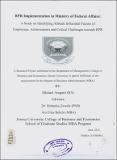| dc.description.abstract | Abstract
Implementation is the most difficult phase. In implementing BPR, employees have different
attitudes towards BPR and depend on those factors the organization faces a lot of challenges.
Whereas, if the organization passes those challenges, there are an appreciated achievements.
The objective was to assess the implementation of Business Process Re-engineering in the
Ministry of Federal Affairs.
The research project was engaged with both the qualitative and quantitative research strategies.
A cross sectional research design was conducted. In order to substantiate the results the data's
were collected by using structured questionnaires and in-depth interviews research techniques
were entered in SPSS version J 6.00. J 47 and J 0 key- informant's participants were involved.
Bivariate and multivariate linear regression model was adopted. In the quantitative part,
variables having mean scores> 2.5 had high and < 2.5 had less influential impact on employees
attitude towards BPR. Work experience only in MOFA and educational status were significant
with attitude influential factors towards BPR.
Because of BPR: high impact intervention areas were selected, a shift from here to there types of
job to sedentary ways of job, a shift from fire brigade approach to immediate solution, critical
role and responsibilities for some work unit developed and identified, advanced ways of
registration for new Religion and Faith institutions were developed. Almost all employees have
awareness on BPR. The organization acquired better performance in terms of speed, cost,
quality, quantity and level of customer satisfaction. Similarly, the challenges were Lack of
proper and consistent handling of the program, leaving ownership for performer than owning it,
Performing the program for the seeks of survival than internalizing, Performing based on the
BPR requirements but poor documentation system, Lack of commitment on engagement in the sides of independent stockholders, Accountability problems, and disagreements on selecting the goals and thematic results. Employees who serve more in the organizations and those who have certificate and others out of Master, Degree, Diploma education status had positive attitude while the organization implemented BPR. MOFA should give more emphasize on the factors which have high influential impact on employees to developed a negative attitudes. MOFA should develop a team charter with stockholders to create accountability and responsibility.
Key Words: BPR, Challenging factors, Achievements, Success and Failure of BPR. | en |


